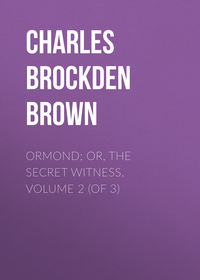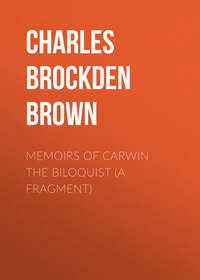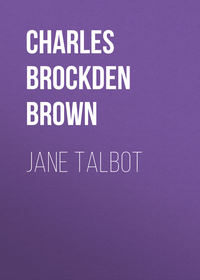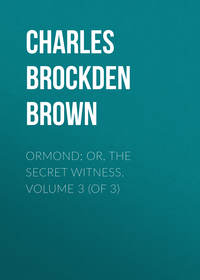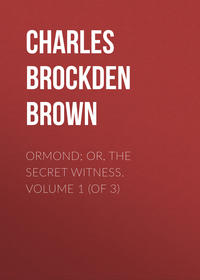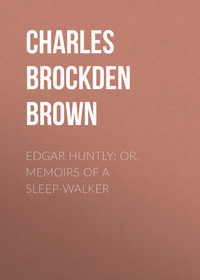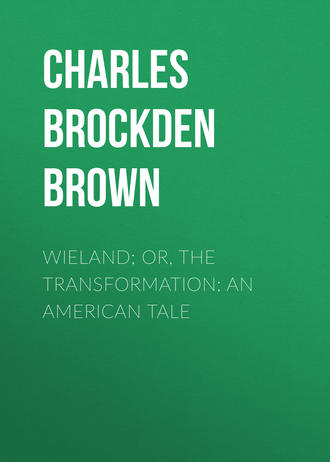 полная версия
полная версияWieland; Or, The Transformation: An American Tale
"I left you to ponder on this scene. My mind was full of rapid and incongruous ideas. Compunction, self-upbraiding, hopelesness, satisfaction at the view of those effects likely to flow from my new scheme, misgivings as to the beneficial result of this scheme took possession of my mind, and seemed to struggle for the mastery.
"I had gone too far to recede. I had painted myself to you as an assassin and ravisher, withheld from guilt only by a voice from heaven. I had thus reverted into the path of error, and now, having gone thus far, my progress seemed to be irrevocable. I said to myself, I must leave these precincts for ever. My acts have blasted my fame in the eyes of the Wielands. For the sake of creating a mysterious dread, I have made myself a villain. I may complete this mysterious plan by some new imposture, but I cannot aggravate my supposed guilt.
"My resolution was formed, and I was swiftly ruminating on the means for executing it, when Pleyel appeared in sight. This incident decided my conduct. It was plain that Pleyel was a devoted lover, but he was, at the same time, a man of cold resolves and exquisite sagacity. To deceive him would be the sweetest triumph I had ever enjoyed. The deception would be momentary, but it would likewise be complete. That his delusion would so soon be rectified, was a recommendation to my scheme, for I esteemed him too much to desire to entail upon him lasting agonies.
"I had no time to reflect further, for he proceeded, with a quick step, towards the house. I was hurried onward involuntarily and by a mechanical impulse. I followed him as he passed the recess in the bank, and shrowding myself in that spot, I counterfeited sounds which I knew would arrest his steps.
"He stopped, turned, listened, approached, and overheard a dialogue whose purpose was to vanquish his belief in a point where his belief was most difficult to vanquish. I exerted all my powers to imitate your voice, your general sentiments, and your language. Being master, by means of your journal, of your personal history and most secret thoughts, my efforts were the more successful. When I reviewed the tenor of this dialogue, I cannot believe but that Pleyel was deluded. When I think of your character, and of the inferences which this dialogue was intended to suggest, it seems incredible that this delusion should be produced.
"I spared not myself. I called myself murderer, thief, guilty of innumerable perjuries and misdeeds: that you had debased yourself to the level of such an one, no evidence, methought, would suffice to convince him who knew you so thoroughly as Pleyel; and yet the imposture amounted to proof which the most jealous scrutiny would find to be unexceptionable.
"He left his station precipitately and resumed his way to the house. I saw that the detection of his error would be instantaneous, since, not having gone to bed, an immediate interview would take place between you. At first this circumstance was considered with regret; but as time opened my eyes to the possible consequences of this scene, I regarded it with pleasure.
"In a short time the infatuation which had led me thus far began to subside. The remembrance of former reasonings and transactions was renewed. How often I had repented this kind of exertion; how many evils were produced by it which I had not foreseen; what occasions for the bitterest remorse it had administered, now passed through my mind. The black catalogue of stratagems was now increased. I had inspired you with the most vehement terrors: I had filled your mind with faith in shadows and confidence in dreams: I had depraved the imagination of Pleyel: I had exhibited you to his understanding as devoted to brutal gratifications and consummate in hypocrisy. The evidence which accompanied this delusion would be irresistible to one whose passion had perverted his judgment, whose jealousy with regard to me had already been excited, and who, therefore, would not fail to overrate the force of this evidence. What fatal act of despair or of vengeance might not this error produce?
"With regard to myself, I had acted with a phrenzy that surpassed belief. I had warred against my peace and my fame: I had banished myself from the fellowship of vigorous and pure minds: I was self-expelled from a scene which the munificence of nature had adorned with unrivalled beauties, and from haunts in which all the muses and humanities had taken refuge.
"I was thus torn by conflicting fears and tumultuous regrets. The night passed away in this state of confusion; and next morning in the gazette left at my obscure lodging, I read a description and an offer of reward for the apprehension of my person. I was said to have escaped from an Irish prison, in which I was confined as an offender convicted of enormous and complicated crimes.
"This was the work of an enemy, who, by falsehood and stratagem, had procured my condemnation. I was, indeed, a prisoner, but escaped, by the exertion of my powers, the fate to which I was doomed, but which I did not deserve. I had hoped that the malice of my foe was exhausted; but I now perceived that my precautions had been wise, for that the intervention of an ocean was insufficient for my security.
"Let me not dwell on the sensations which this discovery produced. I need not tell by what steps I was induced to seek an interview with you, for the purpose of disclosing the truth, and repairing, as far as possible, the effects of my misconduct. It was unavoidable that this gazette would fall into your hands, and that it would tend to confirm every erroneous impression.
"Having gained this interview, I purposed to seek some retreat in the wilderness, inaccessible to your inquiry and to the malice of my foe, where I might henceforth employ myself in composing a faithful narrative of my actions. I designed it as my vindication from the aspersions that had rested on my character, and as a lesson to mankind on the evils of credulity on the one hand, and of imposture on the other.
"I wrote you a billet, which was left at the house of your friend, and which I knew would, by some means, speedily come to your hands. I entertained a faint hope that my invitation would be complied with. I knew not what use you would make of the opportunity which this proposal afforded you of procuring the seizure of my person; but this fate I was determined to avoid, and I had no doubt but due circumspection, and the exercise of the faculty which I possessed, would enable me to avoid it.
"I lurked, through the day, in the neighbourhood of Mettingen: I approached your habitation at the appointed hour: I entered it in silence, by a trap-door which led into the cellar. This had formerly been bolted on the inside, but Judith had, at an early period in our intercourse, removed this impediment. I ascended to the first floor, but met with no one, nor any thing that indicated the presence of an human being.
"I crept softly up stairs, and at length perceived your chamber door to be opened, and a light to be within. It was of moment to discover by whom this light was accompanied. I was sensible of the inconveniencies to which my being discovered at your chamber door by any one within would subject me; I therefore called out in my own voice, but so modified that it should appear to ascend from the court below, 'Who is in the chamber? Is it Miss Wieland?"
"No answer was returned to this summons. I listened, but no motion could be heard. After a pause I repeated my call, but no less ineffectually.
"I now approached nearer the door, and adventured to look in. A light stood on the table, but nothing human was discernible. I entered cautiously, but all was solitude and stillness.
"I knew not what to conclude. If the house were inhabited, my call would have been noticed; yet some suspicion insinuated itself that silence was studiously kept by persons who intended to surprize me. My approach had been wary, and the silence that ensued my call had likewise preceded it; a circumstance that tended to dissipate my fears.
"At length it occurred to me that Judith might possibly be in her own room. I turned my steps thither; but she was not to be found. I passed into other rooms, and was soon convinced that the house was totally deserted. I returned to your chamber, agitated by vain surmises and opposite conjectures. The appointed hour had passed, and I dismissed the hope of an interview.
"In this state of things I determined to leave a few lines on your toilet, and prosecute my journey to the mountains. Scarcely had I taken the pen when I laid it aside, uncertain in what manner to address you. I rose from the table and walked across the floor. A glance thrown upon the bed acquainted me with a spectacle to which my conceptions of horror had not yet reached.
"In the midst of shuddering and trepidation, the signal of your presence in the court below recalled me to myself. The deed was newly done: I only was in the house: what had lately happened justified any suspicions, however enormous. It was plain that this catastrophe was unknown to you: I thought upon the wild commotion which the discovery would awaken in your breast: I found the confusion of my own thoughts unconquerable, and perceived that the end for which I sought an interview was not now to be accomplished.
"In this state of things it was likewise expedient to conceal my being within. I put out the light and hurried down stairs. To my unspeakable surprize, notwithstanding every motive to fear, you lighted a candle and proceeded to your chamber.
"I retired to that room below from which a door leads into the cellar. This door concealed me from your view as you passed. I thought upon the spectacle which was about to present itself. In an exigence so abrupt and so little foreseen, I was again subjected to the empire of mechanical and habitual impulses. I dreaded the effects which this shocking exhibition, bursting on your unprepared senses, might produce.
"Thus actuated, I stept swiftly to the door, and thrusting my head forward, once more pronounced the mysterious interdiction. At that moment, by some untoward fate, your eyes were cast back, and you saw me in the very act of utterance. I fled through the darksome avenue at which I entered, covered with the shame of this detection.
"With diligence, stimulated by a thousand ineffable emotions, I pursued my intended journey. I have a brother whose farm is situated in the bosom of a fertile desert, near the sources of the Leheigh, and thither I now repaired."
Chapter XXIV
"Deeply did I ruminate on the occurrences that had just passed. Nothing excited my wonder so much as the means by which you discovered my being in the closet. This discovery appeared to be made at the moment when you attempted to open it. How could you have otherwise remained so long in the chamber apparently fearless and tranquil? And yet, having made this discovery, how could you persist in dragging me forth: persist in defiance of an interdiction so emphatical and solemn?
"But your sister's death was an event detestable and ominous. She had been the victim of the most dreadful species of assassination. How, in a state like yours, the murderous intention could be generated, was wholly inconceivable.
"I did not relinquish my design of confessing to you the part which I had sustained in your family, but I was willing to defer it till the task which I had set myself was finished. That being done, I resumed the resolution. The motives to incite me to this continually acquired force. The more I revolved the events happening at Mettingen, the more insupportable and ominous my terrors became. My waking hours and my sleep were vexed by dismal presages and frightful intimations.
"Catharine was dead by violence. Surely my malignant stars had not made me the cause of her death; yet had I not rashly set in motion a machine, over whose progress I had no controul, and which experience had shewn me was infinite in power? Every day might add to the catalogue of horrors of which this was the source, and a seasonable disclosure of the truth might prevent numberless ills.
"Fraught with this conception, I have turned my steps hither. I find your brother's house desolate: the furniture removed, and the walls stained with damps. Your own is in the same situation. Your chamber is dismantled and dark, and you exhibit an image of incurable grief, and of rapid decay.
"I have uttered the truth. This is the extent of my offences. You tell me an horrid tale of Wieland being led to the destruction of his wife and children, by some mysterious agent. You charge me with the guilt of this agency; but I repeat that the amount of my guilt has been truly stated. The perpetrator of Catharine's death was unknown to me till now; nay, it is still unknown to me."
At that moment, the closing of a door in the kitchen was distinctly heard by us. Carwin started and paused. "There is some one coming. I must not be found here by my enemies, and need not, since my purpose is answered."
I had drunk in, with the most vehement attention, every word that he had uttered. I had no breath to interrupt his tale by interrogations or comments. The power that he spoke of was hitherto unknown to me: its existence was incredible; it was susceptible of no direct proof.
He owns that his were the voice and face which I heard and saw. He attempts to give an human explanation of these phantasms; but it is enough that he owns himself to be the agent; his tale is a lie, and his nature devilish. As he deceived me, he likewise deceived my brother, and now do I behold the author of all our calamities!
Such were my thoughts when his pause allowed me to think. I should have bad him begone if the silence had not been interrupted; but now I feared no more for myself; and the milkiness of my nature was curdled into hatred and rancour. Some one was near, and this enemy of God and man might possibly be brought to justice. I reflected not that the preternatural power which he had hitherto exerted, would avail to rescue him from any toils in which his feet might be entangled. Meanwhile, looks, and not words of menace and abhorrence, were all that I could bestow.
He did not depart. He seemed dubious, whether, by passing out of the house, or by remaining somewhat longer where he was, he should most endanger his safety. His confusion increased when steps of one barefoot were heard upon the stairs. He threw anxious glances sometimes at the closet, sometimes at the window, and sometimes at the chamber door, yet he was detained by some inexplicable fascination. He stood as if rooted to the spot.
As to me, my soul was bursting with detestation and revenge. I had no room for surmises and fears respecting him that approached. It was doubtless a human being, and would befriend me so far as to aid me in arresting this offender.
The stranger quickly entered the room. My eyes and the eyes of Carwin were, at the same moment, darted upon him. A second glance was not needed to inform us who he was. His locks were tangled, and fell confusedly over his forehead and ears. His shirt was of coarse stuff, and open at the neck and breast. His coat was once of bright and fine texture, but now torn and tarnished with dust. His feet, his legs, and his arms were bare. His features were the seat of a wild and tranquil solemnity, but his eyes bespoke inquietude and curiosity.
He advanced with firm step, and looking as in search of some one. He saw me and stopped. He bent his sight on the floor, and clenching his hands, appeared suddenly absorbed in meditation. Such were the figure and deportment of Wieland! Such, in his fallen state, were the aspect and guise of my brother!
Carwin did not fail to recognize the visitant. Care for his own safety was apparently swallowed up in the amazement which this spectacle produced. His station was conspicuous, and he could not have escaped the roving glances of Wieland; yet the latter seemed totally unconscious of his presence.
Grief at this scene of ruin and blast was at first the only sentiment of which I was conscious. A fearful stillness ensued. At length Wieland, lifting his hands, which were locked in each other, to his breast, exclaimed, "Father! I thank thee. This is thy guidance. Hither thou hast led me, that I might perform thy will: yet let me not err: let me hear again thy messenger!"
He stood for a minute as if listening; but recovering from his attitude, he continued—"It is not needed. Dastardly wretch! thus eternally questioning the behests of thy Maker! weak in resolution! wayward in faith!"
He advanced to me, and, after another pause, resumed: "Poor girl! a dismal fate has set its mark upon thee. Thy life is demanded as a sacrifice. Prepare thee to die. Make not my office difficult by fruitless opposition. Thy prayers might subdue stones; but none but he who enjoined my purpose can shake it."
These words were a sufficient explication of the scene. The nature of his phrenzy, as described by my uncle, was remembered. I who had sought death, was now thrilled with horror because it was near. Death in this form, death from the hand of a brother, was thought upon with undescribable repugnance.
In a state thus verging upon madness, my eye glanced upon Carwin. His astonishment appeared to have struck him motionless and dumb. My life was in danger, and my brother's hand was about to be embrued in my blood. I firmly believed that Carwin's was the instigation. I could rescue me from this abhorred fate; I could dissipate this tremendous illusion; I could save my brother from the perpetration of new horrors, by pointing out the devil who seduced him; to hesitate a moment was to perish. These thoughts gave strength to my limbs, and energy to my accents: I started on my feet. "O brother! spare me, spare thyself: There is thy betrayer. He counterfeited the voice and face of an angel, for the purpose of destroying thee and me. He has this moment confessed it. He is able to speak where he is not. He is leagued with hell, but will not avow it; yet he confesses that the agency was his."
My brother turned slowly his eyes, and fixed them upon Carwin. Every joint in the frame of the latter trembled. His complexion was paler than a ghost's. His eye dared not meet that of Wieland, but wandered with an air of distraction from one space to another.
"Man," said my brother, in a voice totally unlike that which he had used to me, "what art thou? The charge has been made. Answer it. The visage—the voice—at the bottom of these stairs—at the hour of eleven—To whom did they belong? To thee?"
Twice did Carwin attempt to speak, but his words died away upon his lips. My brother resumed in a tone of greater vehemence—
"Thou falterest; faltering is ominous; say yes or no: one word will suffice; but beware of falsehood. Was it a stratagem of hell to overthrow my family? Wast thou the agent?"
I now saw that the wrath which had been prepared for me was to be heaped upon another. The tale that I heard from him, and his present trepidations, were abundant testimonies of his guilt. But what if Wieland should be undeceived! What if he shall find his acts to have proceeded not from an heavenly prompter, but from human treachery! Will not his rage mount into whirlwind? Will not he tare limb from limb this devoted wretch?
Instinctively I recoiled from this image, but it gave place to another. Carwin may be innocent, but the impetuosity of his judge may misconstrue his answers into a confession of guilt. Wieland knows not that mysterious voices and appearances were likewise witnessed by me. Carwin may be ignorant of those which misled my brother. Thus may his answers unwarily betray himself to ruin.
Such might be the consequences of my frantic precipitation, and these, it was necessary, if possible, to prevent. I attempted to speak, but Wieland, turning suddenly upon me, commanded silence, in a tone furious and terrible. My lips closed, and my tongue refused its office.
"What art thou?" he resumed, addressing himself to Carwin. "Answer me; whose form—whose voice—was it thy contrivance? Answer me."
The answer was now given, but confusedly and scarcely articulated. "I meant nothing—I intended no ill—if I understand—if I do not mistake you—it is too true—I did appear—in the entry—did speak. The contrivance was mine, but—"
These words were no sooner uttered, than my brother ceased to wear the same aspect. His eyes were downcast: he was motionless: his respiration became hoarse, like that of a man in the agonies of death. Carwin seemed unable to say more. He might have easily escaped, but the thought which occupied him related to what was horrid and unintelligible in this scene, and not to his own danger.
Presently the faculties of Wieland, which, for a time, were chained up, were seized with restlessness and trembling. He broke silence. The stoutest heart would have been appalled by the tone in which he spoke. He addressed himself to Carwin.
"Why art thou here? Who detains thee? Go and learn better. I will meet thee, but it must be at the bar of thy Maker. There shall I bear witness against thee."
Perceiving that Carwin did not obey, he continued; "Dost thou wish me to complete the catalogue by thy death? Thy life is a worthless thing. Tempt me no more. I am but a man, and thy presence may awaken a fury which may spurn my controul. Begone!"
Carwin, irresolute, striving in vain for utterance, his complexion pallid as death, his knees beating one against another, slowly obeyed the mandate and withdrew.
Chapter XXV
A few words more and I lay aside the pen for ever. Yet why should I not relinquish it now? All that I have said is preparatory to this scene, and my fingers, tremulous and cold as my heart, refuse any further exertion. This must not be. Let my last energies support me in the finishing of this task. Then will I lay down my head in the lap of death. Hushed will be all my murmurs in the sleep of the grave.
Every sentiment has perished in my bosom. Even friendship is extinct. Your love for me has prompted me to this task; but I would not have complied if it had not been a luxury thus to feast upon my woes. I have justly calculated upon my remnant of strength. When I lay down the pen the taper of life will expire: my existence will terminate with my tale.
Now that I was left alone with Wieland, the perils of my situation presented themselves to my mind. That this paroxysm should terminate in havock and rage it was reasonable to predict. The first suggestion of my fears had been disproved by my experience. Carwin had acknowledged his offences, and yet had escaped. The vengeance which I had harboured had not been admitted by Wieland, and yet the evils which I had endured, compared with those inflicted on my brother, were as nothing. I thirsted for his blood, and was tormented with an insatiable appetite for his destruction; yet my brother was unmoved, and had dismissed him in safety. Surely thou wast more than man, while I am sunk below the beasts.
Did I place a right construction on the conduct of Wieland? Was the error that misled him so easily rectified? Were views so vivid and faith so strenuous thus liable to fading and to change? Was there not reason to doubt the accuracy of my perceptions? With images like these was my mind thronged, till the deportment of my brother called away my attention.
I saw his lips move and his eyes cast up to heaven. Then would he listen and look back, as if in expectation of some one's appearance. Thrice he repeated these gesticulations and this inaudible prayer. Each time the mist of confusion and doubt seemed to grow darker and to settle on his understanding. I guessed at the meaning of these tokens. The words of Carwin had shaken his belief, and he was employed in summoning the messenger who had formerly communed with him, to attest the value of those new doubts. In vain the summons was repeated, for his eye met nothing but vacancy, and not a sound saluted his ear.
He walked to the bed, gazed with eagerness at the pillow which had sustained the head of the breathless Catharine, and then returned to the place where I sat. I had no power to lift my eyes to his face: I was dubious of his purpose: this purpose might aim at my life.
Alas! nothing but subjection to danger, and exposure to temptation, can show us what we are. By this test was I now tried, and found to be cowardly and rash. Men can deliberately untie the thread of life, and of this I had deemed myself capable; yet now that I stood upon the brink of fate, that the knife of the sacrificer was aimed at my heart, I shuddered and betook myself to any means of escape, however monstrous.


